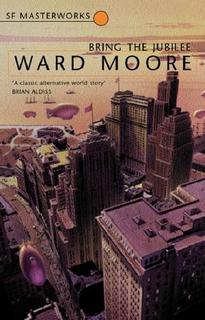 Better as a short story?
Better as a short story?As soon as Hodge Backmacker -- the auto-didact peasant turned pedagogue with a penchant for the history of the American civil war - encounters Barbara Haggerswell -- an iconoclastic physicist and time-machine inventor -- sheltering at the academicist commune of Haggershaven, it is self-evident how the pay-off of to this alternate history novel is going
to be delivered. Despite the fact that this entry in the series is less than 200 pages in length, getting to the stunning final quarter of the book proves something of a slog.
The first quarter of the book is a compressed bildungsroman, detailing Hodge's progress from aspirational hick to man of letters. The middle contains a good deal of redundant exposition regarding Hodge's relationship with Barbara Haggerswell and his salvation of and subsequent marriage to Carrolita, rescued as an adolescent from the scene of a roadside robbery of a member of the Spanish aristocracy and his wife. The final four chapters, in which Hodge ventures back into the past to ratify his theories about the battle of Gettysburg with monumental consequences are quite magnificent, and I'd recommend Bring the Jubilee on this basis alone.
In addition, many appealing aspects of alternate history run through this entry in the SF Masterworks series: I enjoyed Moore's depiction of the impoverished and struggling 26 states which form the United States in this novel on the basis of the Confederacy having won the American civil war and prospering at the expense of the north. You too may enjoy the ur-steampunk minibles and air balloons of a familiar yet strange turn-of-the-twentieth-century New York.
